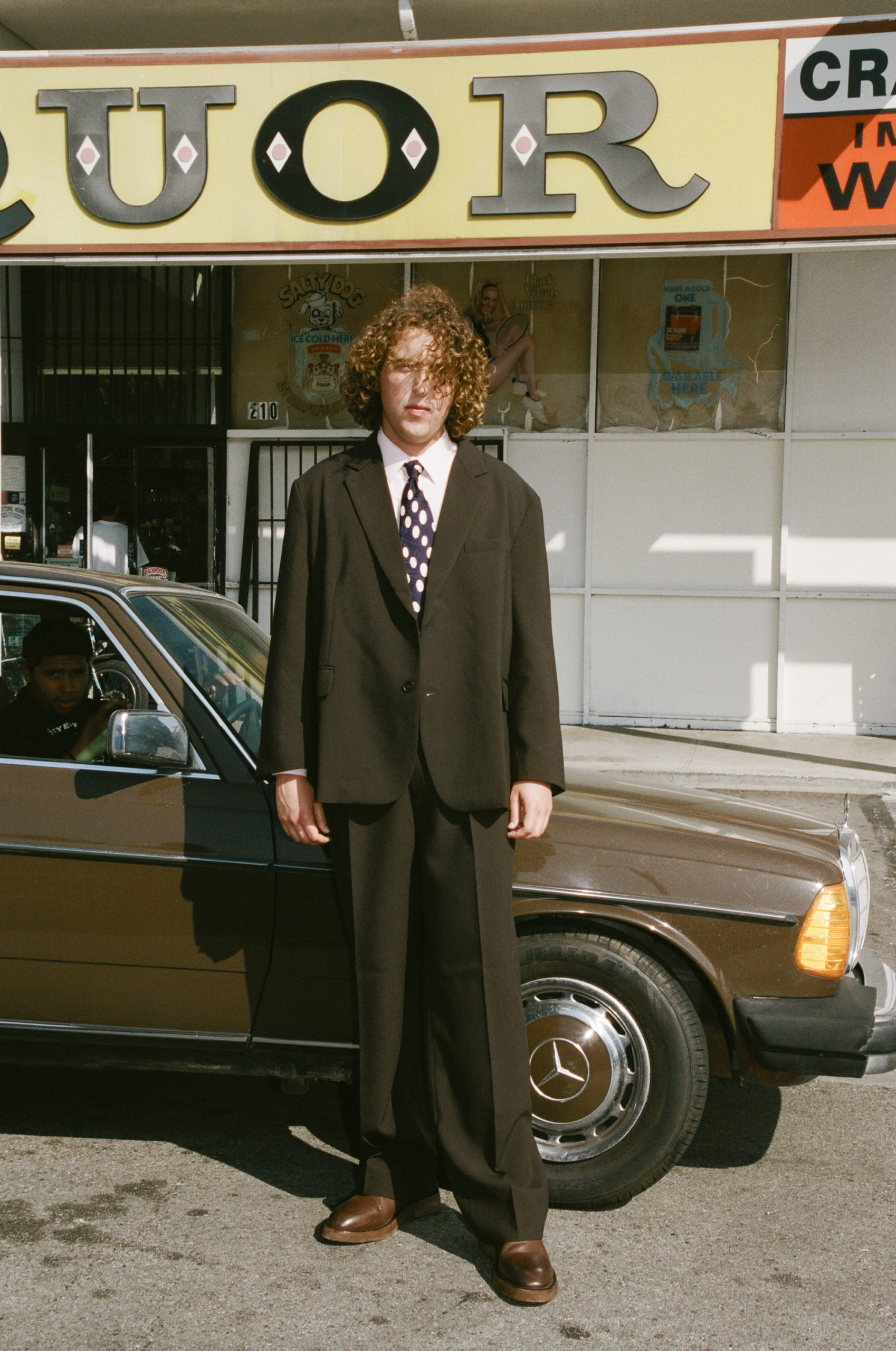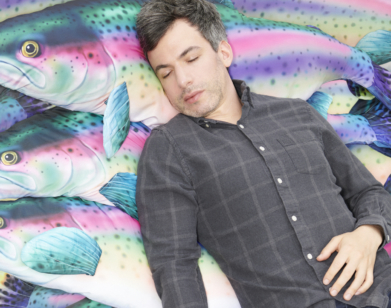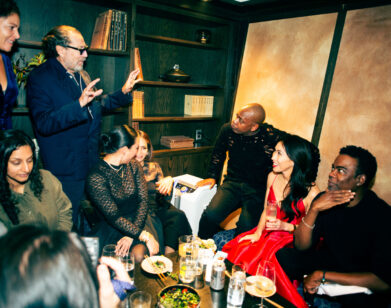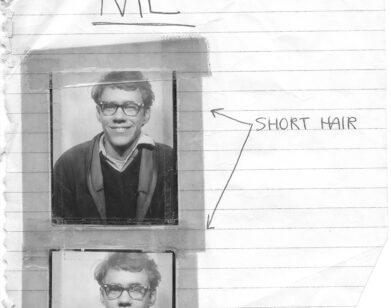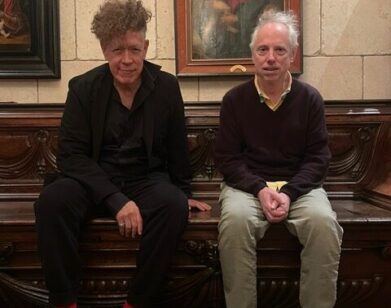JOURNALISM
Andrew Callaghan and Louis Theroux on Exposing America’s Extremes
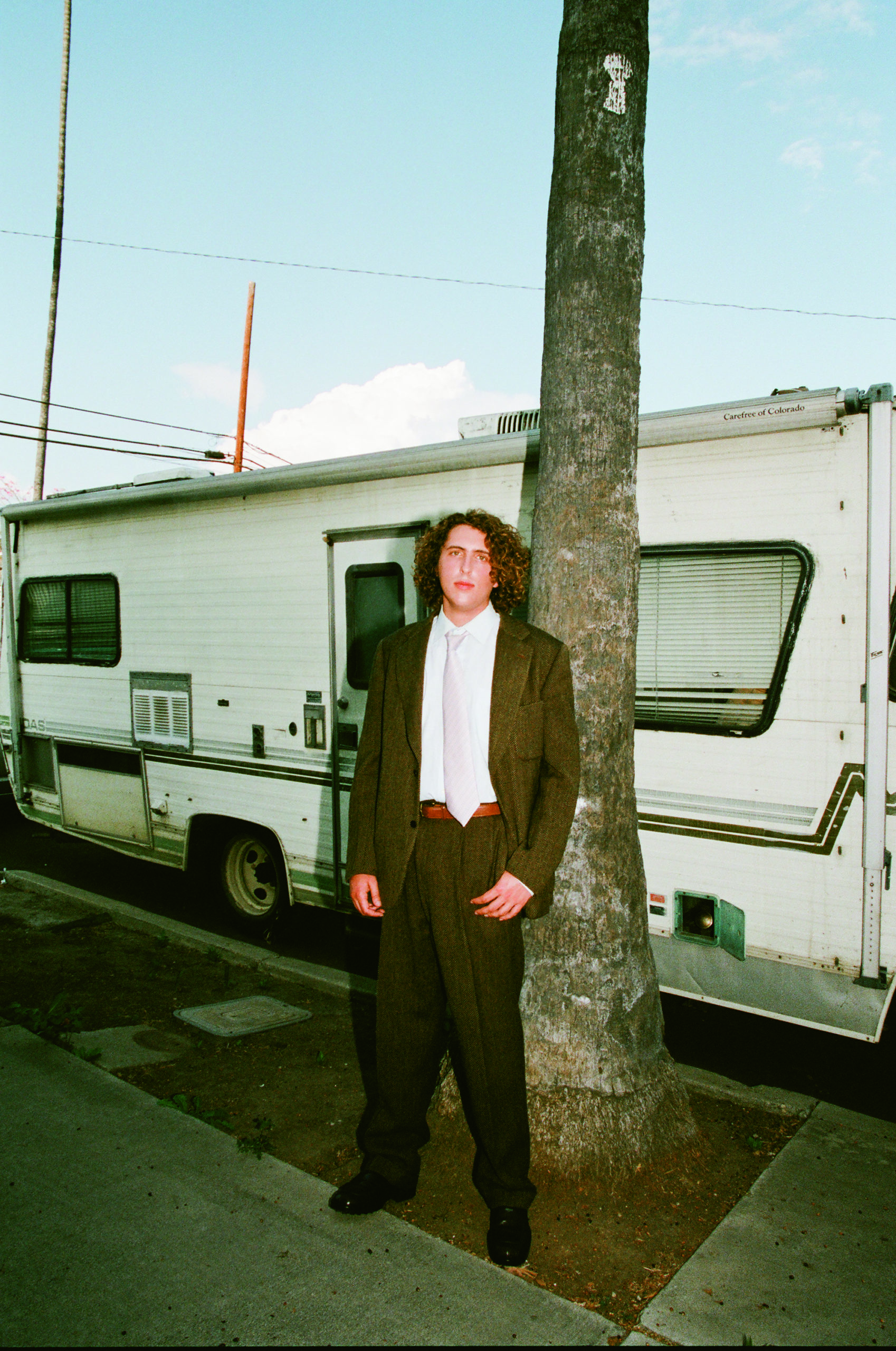
Suit and Belt from Palace Costume. Shirt by Loro Piana. Tie by Hermès. Shoes (worn throughout) by Marsèll.
The legend of Andrew Callaghan began on Bourbon Street, where the self-described troubled kid worked as a doorman while interviewing drunk tourists in a series he called Quarter Confessions. The clips were an Instagram smash, and soon Callaghan and his friends were hitting the road in an RV for a web series they called All Gas No Brakes. The mission? Travel across the country and expose the weirder corners of American society, from furries to QAnon diehards. Callaghan’s interview style—deadpan and droll—masked a dedication to craft that only the most serious journalists possess, which became apparent when he and his partners launched the YouTube show Channel 5, where one could find Callaghan interviewing a gangster rapper one moment and seeking shelter in war-torn Ukraine the next. All of it has led up to his new HBO documentary This Place Rules, a cross-country exploration of an America eating itself. To help Callaghan unpack why and how he does what he does, we put him in touch with one of his heroes, the British journalist Louis Theroux. —BEN BARNA
———
LOUIS THEROUX: Nice to meet you. How are you?
ANDREW CALLAGHAN: It’s great to meet you too, man. I’m doing fantastic. I appreciate you making the time.
THEROUX: Where are you?
CALLAGHAN: I’m sitting on the playground at Venice Beach.
THEROUX: Do you still live in an RV?
CALLAGHAN: From time to time. I prefer to stay in a steady place for most of the time, so I rent a place in L.A. that’s an editing center of operations, but I still have an RV. It’s become more of a leisure item than an actual method of journalism.
THEROUX: Let’s start like this. How do you describe what you do?
CALLAGHAN: At its best I would call it radically empathetic, unbiased, civilian journalism. But I started in a comedic way. When I first did my interviews, I was a doorman on Bourbon Street in New Orleans. I would interview drunk tourists about their darkest confessions after I got off work. The editing style back then was very much in tune with comedy. I wore a brown suit to give the impression that I worked for a legitimate news organization, and then we’d dive into weird subcultures. So I guess now, I oscillate between comedic and serious reporting, depending on the subject matter. I also wanted to say, you are one of my biggest inspirations. One thing that I’ve learned from your approach is what I call the toddler nod. One of the classic things people would say is, “How does Louis get people to open up like this?” I think you give people just enough of a nod and affirmation to keep going down their tangent, but not so much as to agree with them completely.
THEROUX: I wasn’t even aware of doing a toddler nod, and now I’m worried that’s going to make me self-conscious and I won’t be able to do it anymore because I’ll be overthinking it. How old are you?
CALLAGHAN: Twenty-five.
THEROUX: And how long have you been doing this?
CALLAGHAN: I’ve been making videos for about three years. My career in journalism began when I was 16, writing for my high school newspaper. I was a bit of a troubled kid and I didn’t like school at all. I had this cool teacher who was my high school journalism teacher, and he would let me leave school for hours to do whatever I wanted. As long as I came back with a written piece of journalism to present to him, he would give me attendance and credit. So I would hang out with Juggalos downtown, or go live in “tent city” during the Occupy movement. Stuff like that.
THEROUX: I came up through conventional journalism. I worked in print magazines and then got hired by Michael Moore on a show called TV Nation, and then I got a BBC show. But you kind of did your own thing. How did you reach your public?
CALLAGHAN: I started making my first videos through Instagram. I used to hitchhike around America when I was a teenager and write travel journals and zines about it, and sell them at book fairs in New York. Then I realized that no one really likes to read and that if I wanted to bring journalistic work to the masses, I’d have to engineer something for a very limited millennial attention span. So I made these short Instagram clips engineered to grip people, to be shocking, and then post-shock, are a segue to some relevant information.
THEROUX: You’re a great example of someone who’s come to a huge audience through a nontraditional route. You never depended on execs saying, “We’re going to give this guy a chance.” But nevertheless, I see a lot of overlap in the subjects we’ve covered. Like you, I’ve spoken to neo-Nazis, gangster rappers, and people in all kinds of outsider cultures. What people say to me oftentimes is, if you’re talking to a racist guy, why do you not get annoyed with them? And I say, “Because I just want to hear what they’ve got to say.” What’s your take on that? Is it uncomfortable? Do you feel a compulsion to challenge them?
CALLAGHAN: People like that come out of the gate expecting to be disagreed with. They make salacious or inflammatory statements expecting someone to denounce their perspective and be like, “You think the earth’s flat? You’re a fucking idiot.” But if you just say, “Oh, that’s a valid point,” they feel comfortable enough to dig their own hole. I’ve seen antisemitism in places you’d never even expect. I’ve talked to people at sporting events, and I’d ask, “Why do you think the White Sox lost today?” And someone’s like, “Everything’s fixed.” And you say, “Oh yeah, it is.” And then they say, “I’m not going to say it, but it’s Israel.” And you’re like, “Yeah, yeah, could be.” And they’re like, “You know, because Israel’s controlled by Jews. A Rothschild invented the banking system and that’s why my team lost.”
THEROUX: I think you’ve got to be the idiot in the room sometimes. The worst thing is when two people who know a lot about a subject are talking about it in a way that the audience doesn’t get a look in. I did a piece about a Miami jail, and what everyone was telling me was, “Snitches get stitches.” People would be stabbed in the jail and no one would ever say who did it. So I went to the jail and someone had been stabbed the previous week, so of course the question I asked was, “Who did it?” And the silence in the room was extraordinary. The leader of the cell was a guy called Hot Rod. He was like, “Ain’t nobody going to tell you that, man.” That tension of saying the thing that you’re not supposed to say can create a beautiful energy. So tell me, how did this HBO deal take place?
CALLAGHAN: I was at something called the UFO Mega Conference in Laughlin, Nevada. I’m sure you’ve had this experience, where you go to an event that you figure is going to be fun and high energy, and you realize that it’s all people in their mid-eighties to late-seventies, just talking about conspiracy nonsense.
THEROUX: I’ve been to that conference.
CALLAGHAN: I’d ask basic questions, like what makes you think UFOs are real? And I remember the daughter of Bob Brown [the founder of the conference] said, “My dad doesn’t think you believe in UFOs. We’re going to revoke your press card.” So I was kind of in a rut. No one wanted to interview with us. They thought we were deep-state UFO deniers. Then Eric Wareheim DMed me on Instagram, and he’s like, “Hey, you want to make a TV show?” I was like, this sounds like a good alternative to the UFO conference. I met up with him and we pitched a TV show around, but I was locked into a 360 contract with Doing Things Media for All Gas No Brakes. Every one of our pitches got rejected. So we figured, alright, no show. At the last minute, Jonah Hill emails me and he’s like, “Hey man, I’m a big fan. I know some people at A24. Let’s make a movie about whatever you want.”
THEROUX: What’s A24?
CALLAGHAN: It’s an artsy American production house. They made Midsommar and Hereditary. So he’s like, “What do you want to make a movie about?” And I was like, “Well, the 2020 election is coming up.” I was on the front lines of the 2020 protests in Minneapolis, Portland, and Seattle. I’d also been covering anti-vax rallies in California and Florida, so I was like, “Alright, let me make a movie.” Because I knew that for sure if Trump won, there would be riots, and that if Trump lost, there would be some kind of coup that they would stage at the Capitol, denying the election results. I just knew that something bad was going to happen. So A24 bought me an RV—and this was a 36-foot Winnebago, Class A, diesel powered, complete rust bucket that we got in Georgia for probably $10,000—and I spent the next three months going up and down the East Coast from Florida to New York and Georgia during the “Stop the Steal” movement. And then we finished the movie, I edited it back in L.A., and HBO just bought it two-and-a-half weeks ago.
THEROUX: It’s got a very crazy opening ten minutes featuring two rival rappers—white rappers—from Florida.
CALLAGHAN: I would call them mid-level prank influencers from Central Florida.
THEROUX: Okay, interesting. Why did you decide to start the movie in that way?
CALLAGHAN: Because I know that most Americans are disengaged from the political theater that took place in 2020. You and I being journalists and media consumers, it probably seemed all-encompassing at the time. But a large portion of America just goes to work, binge-watches their favorite shows, and aren’t really engaged with things that don’t affect their day-to-day life. Also, I wanted to prank the intellectual audience. Because we have all these important interviews: Alex Jones, Enrique Tarrio, other Proud Boys that are now charged with sedition—and I was like, if you want to watch this, you have to watch Joker Gang and Gum Gang smoke weed out of a fish’s ass before you get to the meat, because that’s America, too.
THEROUX: I was totally compelled. It feels like high-octane Harmony Korine–type shit.
CALLAGHAN: As a journalist who seeks out the fringe, do you ever deal with a feeling that things are hopelessly spiraling in all directions?
THEROUX: It’s hard to resist the conclusion that things are getting worse. I’m more pessimistic about the direction of culture now than I was 20 years ago. But, people say, “You go into these places and interview pedophiles or hardened criminals, doesn’t that depress you?” But I see a lot of humanity in those places, as weird as that may sound. In terms of going to the dark zone, because I’m in communities in which people are finding a connection, whether or not they are deluded, I genuinely tend to see their good qualities. The occupational hazard I run into is of slightly going native. I’m curious to know whether you feel that at all. When I’m in a convention talking to a bunch of people it might not happen. But when I’m in the world, immersed for maybe days or weeks at a time, I start to think, not so much that they’ve got a point, but just that I can see where they’re coming from, why he or she’s come to this set of beliefs.
CALLAGHAN: What do you mean by going native?
THEROUX: I mean being exposed. When I was at Westboro Baptist Church, I spent three weeks there, more or less, every day over three separate trips. After the fourth or fifth day, the sign that says some homophobic thing, you start to think like, well, it’s just a sign. You start to normalize and become anesthetized to aspects of the behavior. The shock value wears off.
CALLAGHAN: I’m happy you mentioned that because I do fall into that often. Because in order to get a good interview with someone, I find myself leveling with them for a long period of time. Some of that involves a lot of off-camera socializing. The reason I was able to get those Proud Boys interviews in front of the Capitol is because I was drinking at a bar with those guys for a couple hours. I was meeting them at their house. I end up humanizing people sometimes to the degree that I forget the negative impact they’ve had on the world. That happened with Alex Jones, in particular. You’re talking about interviewing pedophiles, killers. I’ve never interviewed anyone like that, but I’ve definitely interviewed some shitty people.
THEROUX: You interviewed a pedophile in your film.
CALLAGHAN: Oh yeah, that’s true. I’ve interviewed one pedophile, but the world hasn’t seen that yet.
THEROUX: I’m not going to say any more about it because that would be a spoiler. You mentioned your Alex Jones interview, which is extraordinary.
CALLAGHAN: Yeah.
THEROUX: How much do you think about platforming views, or giving virality to views that are clearly harmful or have done harm? Are there people you would not put on TV or is it just a case of finding the right approach?
CALLAGHAN: I always say the same thing. If a shitty person or organization is a household name, then I don’t think that me platforming them does anything to broaden their reach, especially if it’s a critical angle. Everybody knows who Alex Jones is. Everybody knows who the Proud Boys are. So when I’m doing a video where I’m diving into that world, it’s not like I’m introducing or spreading their reach. But I wouldn’t make a video on YouTube with Nick Fuentes. I wouldn’t make a video with Patriot Front. I wouldn’t make a video with anyone who has a significantly smaller media presence because that’s where the pedestal element happens. And all the people who ever hate on me for platforming problematic ideologies, I don’t want those people as fans. It’s not the way I go around viewing the world. I don’t think that turning a blind eye to a large contingent of people, or censoring them, does anything to solve the root of the problem. That’s the most annoying criticism that I get. “Why are you platforming hate speech?” I don’t think that I am. I’m exposing public figures for propagating hate speech. When people say, “Why did you go to a Q conference and platform General Flynn? He believes that Democrats boil and bake children, mix them in a stew, and go somewhere in Hollywood with their ladles and sip on the blood.” I’m like, “There’s 40 million Americans who believe this. So just because you, from your bubble, aren’t aware that this is a dominant thread, doesn’t mean that I have to turn a blind eye to it because you’re shocked.” Ignoring something doesn’t make it go away.
THEROUX: How much do you think social media is behind the dislocation that we see in the American landscape? And to what extent do you think kicking people off social media is the solution?
CALLAGHAN: I would say that social media is solely responsible for the algorithm-driven echo chamber effect. You read one news article and they can tell what kind of shit you want to consume, so you get stuck in a doom-scrolling outrage cycle where they know what pisses you off. If you watch a couple of videos on your phone about trans women using the restroom at a local spa in L.A., and you watch a couple outrage reactions, before you know it, you get hypnotized by your own algorithm.
THEROUX: Right.
CALLAGHAN: People thought the internet would make folks smarter, but I think it’s done the opposite. It’s made everyone feel like a genius who doesn’t need to learn anything. As far as deplatforming goes, it’s really a case by case thing. I agree with the deplatforming of Alex Jones and Andrew Tate from YouTube, because a lot of the shit they’re millions of hits. But my worry is that when you deplatform someone from Facebook for misinformation, they’re probably just saying some shit they heard from someone else, and then they get further and further down the deplatform rabbit hole. Now they’re only on Parler and BitChute and Rumble, these alt platforms that are chockful of literal neo-Nazis who are spreading great replacement theory, white genocide theory. Before you know it, this person who was dillydallying in what they didn’t even realize was the tip of the conspiracy iceberg, is completely waist-deep in quicksand, falling into an even deeper, more troubling informational echo chamber. That’s how you get shit like January 6. So on one hand I say, “Fuck those guys, take them off YouTube. They’re spreading problematic speech.” But let’s say that you have 40 million people that are following a right-wing conspiracy radio host. You remove them from YouTube. Data suggests that they retain 10 percent of their original following, who follow them to an alt platform where everyone is also a hard-core fringe person. So you create this black-sheep rebel army, where being deplatformed only serves to validate their thesis, which is that they’re the target, that they were deplatformed because they’re speaking the truth. So you’re only really validating what they already think. It’s a vector for extremism. And I don’t really think there’s a solution. As journalists, our job is to expose problems and expose corruption and misinformation, but we don’t actually have a plan.
THEROUX: That’s not our job. We have to identify the problems, but we don’t have to provide solutions. Do you have reasons to feel optimistic or do you feel like things are going to keep going in the shitter?
CALLAGHAN: I try to find optimism and fulfillment in my daily life. Doing things like hanging out with family, developing good friendships and relationships, traveling.
THEROUX: Well listen, it was a pleasure talking to you. I’m sorry to cut and run. I’ve got a little kid to pick up.
CALLAGHAN: Thanks, man. And thank you for everything you’ve done. You’ve taught me a lot about how I should go about doing my job, and what it means to be a true journalist and put aside your agenda and just seek the truth.
THEROUX: Wow, that’s lovely. Thank you for that. I really enjoyed it.
CALLAGHAN: Appreciate you, Louis.
The HBO Original This Place Rules debuts Friday, December 30 (11:00 p.m. – 12:22 a.m. ET/PT) on HBO and will be available to stream on HBO Max.
———
Grooming: Frankie Payne using Oribe and Natrium at Opus Beauty

